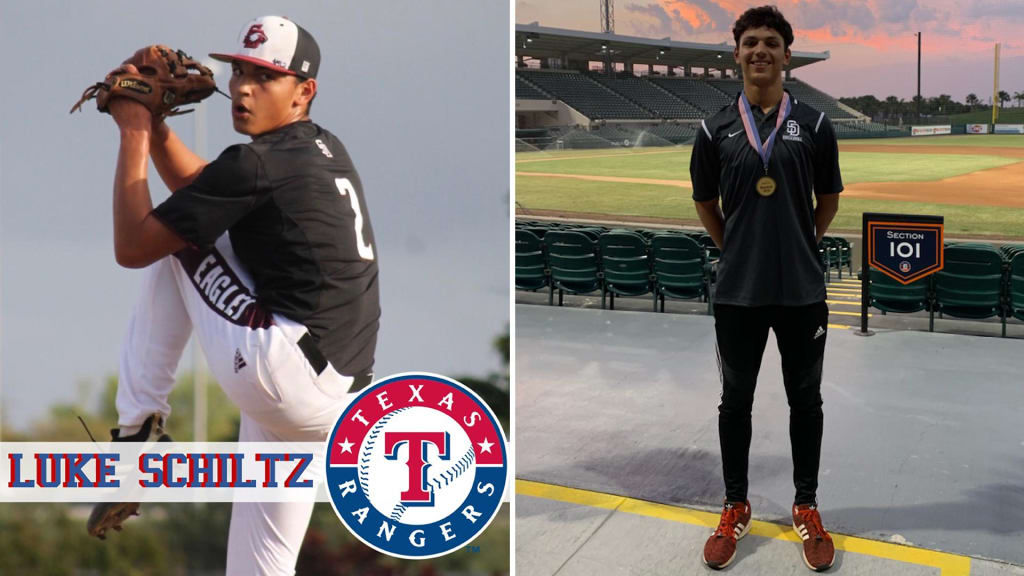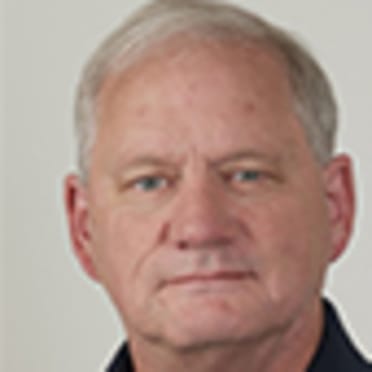
ARLINGTON -- Rangers amateur scout Cliff Terracuso paid a visit to Marjory Stoneman Douglas High School in Parkland, Fla., last November to check on another group of talented athletes from a highly successful baseball program.
Nine months earlier the school had been the scene of the deadliest high school shooting in American history. A lone gunman killed 17 students and staff members, wounding 17 others.
Now the school was trying to get back to normalcy and the baseball team was gearing up for another promising season under head coach Todd Fitz-Gerald. The Eagles had won six straight district titles and the 2016 state championship. Nine players would have college commitments once the season was over.
“The year before had been really tough on our kids, but they came back strong,” Fitz-Gerald said. “Our kids are pretty resilient, they have been together for years and years. They are pretty close.”
But on this autumn day, Terracuso watched a 6-foot-5 pitcher throwing the ball with noticeable zip. Problem was, Terracuso had never seen him before.
“I had no idea who he was,” Terracuso said. “Did I miss something? I didn’t see him at all last year.”
There was no reason to know the mystery pitcher. Luke Schiltz, who last week became the Rangers’ 24th-round pick in the MLB Draft, was then a senior who had just transferred to Stoneman Douglas. He had pitched just three innings as a junior at Cartersville High School in Georgia and now was trying out playing at a baseball powerhouse that was the site of unspeakable tragedy.
WHY STONEMAN DOUGLAS?
Why would a young man leave his parents and move 600-plus miles south with only older sister McKenzie accompanying him?
When you’re 15 years old and have a gun pointed at your head during a robbery in your front yard, when you flee parties because a gang-related shooting breaks out, when a beloved aunt gets shot in a drive-by … well, all options are on the table. Even if that means moving to where the worst mass school shooting in U.S. history took place.
The way Schiltz saw it, Marjory Stoneman Douglas High School was the perfect situation for him. Who could better relate to what his new classmates had gone through than him? Both player and school found renewal at the same time.
“I knew it was the school, I had heard [about] the shooting,” Schiltz said. “I talked to some of the players and they were telling me their stories, where they were when it happened. I have been through a couple of shootings, I know what it’s like. I know what happened there, and it might help those kids if I shared some of my wisdom. Sometimes they would tell me stuff they are going through, and I would tell them what I went through and we would talk about it.”
The other shared experience was baseball. And it led to Schiltz fulfilling a dream he had harbored since he was 3 years old.
“The opportunity to go out and get the chance to perform like this is almost unreal,” said Schiltz, who is now working out at the Rangers’ Spring Training complex in Arizona.
A SPECIAL FAMILY
Schiltz comes from a special family. Father Craig Schiltz is a small business owner who builds custom cornhole boards. Mother Jennifer Schiltz delivers meals for DoorDash and Grubhub. They have seven children, six of whom -- including Luke -- were adopted. The Schiltzes also have served as hosts at different times for more than 200 foster children.
“My parents love helping kids out,” Schiltz said. “I am adopted, all my siblings are adopted except my older brother. We would take in kids and I would give up my room at times. My little brother would give up his room, because we always liked to help out.”
Over time, though, it became clear Cartersville was not the best place for Luke.
“The first time I was held at gunpoint was when I was 15,” Schiltz said. “Right outside my driveway in Cartersville. We knew the person, he hopped out of the car and he was shaking everybody’s hand … we all knew who he was, but around there you can’t trust anyone. So we were sitting there talking and he said, ‘Let me go get my phone from my car.’
“He walked to his car, came back with a pistol and told us to get against the fence. Four other guys hopped out of the car and they all had guns. They actually pistol-whipped my friend and put the gun to all of us, put the gun to my forehead.”
Schiltz said that’s when he realized that he needed to find a way out. A year later, he was almost caught in the crossfire as gang warfare erupted at a party.
Then, on April 11, 2018, Kathleen Walker, 52, was shot in the hip in a drive-by shooting. The bullet hit her femoral artery, causing massive blood loss. She almost died three times on the operating table and then went into a coma. She survived but still has trouble walking and with her vision.
“She was my closest aunt,” Schiltz said. “I was there the day before it happened. I was like, 'Wow, that could have been me,' if I had been there the next day. Kind of triggered what happened to me when I was 15, so I was like down. It just wasn’t going well for me, I was barely sleeping, everything was going wrong.”
A WAY OUT
Schiltz was a junior playing on the high school varsity team and getting no playing time, in part because he was missing practice to help out with his aunt in the hospital. He ended up pitching just three innings.
“That year was the worst year ever,” Schiltz said. “I would miss a couple of practices to go see my aunt in the hospital. She was on life support and she was in a coma, and we were just waiting for her to wake up. We had to have somebody sitting with her, so I would show up to the practices when I could. There was [no] point in being on the field. At Cartersville, it was not the best place for me. I was just trying to help my family because of what they were going through.”
A family friend ended up being his guardian angel. Pete Sass is a summer traveling team baseball coach, and last summer he was with US Elite and then Beast Mode Prime. He encouraged Schiltz to join up.
“He has been with me through all of this,” Schiltz said. “He knew what was going on, and I hadn’t found a travel team because of what happened to my aunt. I hadn’t been looking around, and it’s really expensive to play when we are having to pay bills in the hospital, and it just isn’t working out well. He told me, ‘Yo, come play with me, I got you, go with us.’”
Sass also was coaching a few players from Stoneman Douglas, and Fitz-Gerald had been keeping an eye on them. That’s when the coach discovered the pitcher.
“I just loved his attitude and competitiveness,” Fitz-Gerald said. “I tried to get into the whole situation, 'Where did you go to school? Why didn’t you pitch? Did you get in trouble?' Tried to figure out what he did.”
Fitz-Gerald suggested the possibility of a transfer. Fitz-Gerald was used to transfers, as parents with big dreams for their children with baseball talent often search high and wide for the right school. There was no doubt with Stoneman Douglas, where baseball is king amid talent-rich South Florida.
“I went home,” Schiltz said. “I talked to my parents and I said, 'It’s not going to work out if I keep staying here, and I want to make it work out because this has been my dream.' I asked my mom if I could switch schools and go down and play at Stoneman Douglas. My mom was like, 'Let’s go for it.’”
He and McKenzie lived in an apartment and made money with home delivery for meals. There were times when she had to return home to Georgia, so he was alone with his thoughts and dreams. He had to fight to keep his grades up because, if nothing else, Fitz-Gerald had arranged for him to play collegiately at Florida Southwestern.
“Our guys took him in no question,” Fitz-Gerald said. “It was a need for us. We needed an arm. He had a good one. There is something about him, he’s just a tough kid. He had his ebbs and flows, but he is still learning. I think he’ll be really good.”
THE DREAM COMES TRUE
Stoneman Douglas proved to be the right environment for Schiltz, away from the trauma back home. He was the Eagles’ No. 2 pitcher on a team that won another district title, appearing in 14 games with a 4-3 record, a 2.61 ERA and 51 strikeouts in 45 2/3 innings. He came to the Eagles throwing 88-91 mph and jumped up to 90-94 mph with regular care and work. He is 6-foot-5, but there is much more weight, strength and power to be gained.
Terracuso saw the talent and a loose, electric arm with potential to grow and recommended him to the Rangers, who took him in the 24th round.
Back home in Cartersville, Schiltz and his family whooped with joy and cried with emotion at the news.
“The best day of my life,” Schiltz said.
Fitz-Gerald urged him to sign and get on with his professional career. He growled at any “advisors” who tried to muscle in and take over. Schiltz had achieved his dream and wasn’t going to wait any longer. Less than a week after being drafted, Schiltz was working out at a Major League facility.
“I’m ready to get on with my professional career,” Schiltz said. “This is everything I dreamed and worked for.”
“It’s such a great story,” Terracuso said. “Luke is an amazing kid, happy-go-lucky. We always talk about adversity, and this kid has overcome it. When you add work ethic and passion, Luke is a potential big leaguer.”
